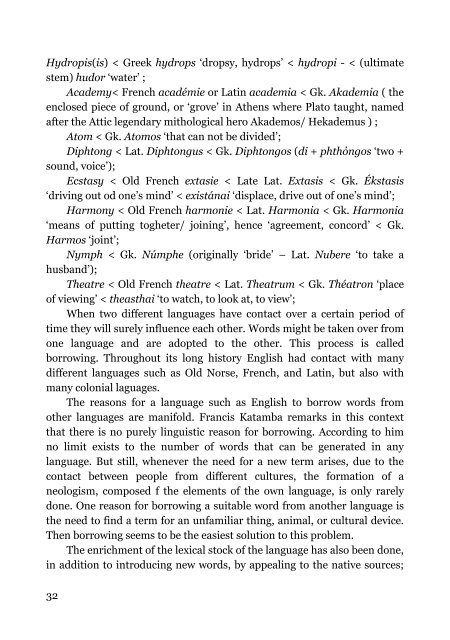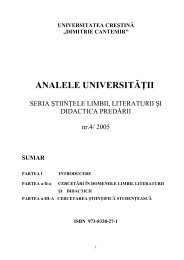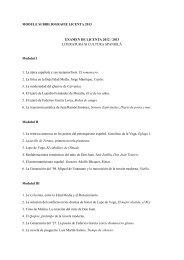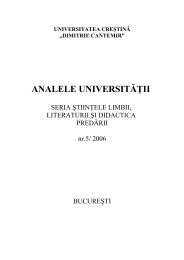analele universităţii - Facultatea de Limbi Straine - Dimitrie Cantemir
analele universităţii - Facultatea de Limbi Straine - Dimitrie Cantemir
analele universităţii - Facultatea de Limbi Straine - Dimitrie Cantemir
Create successful ePaper yourself
Turn your PDF publications into a flip-book with our unique Google optimized e-Paper software.
Hydropis(is) < Greek hydrops ‘dropsy, hydrops’ < hydropi - < (ultimate<br />
stem) hudor ‘water’ ;<br />
Aca<strong>de</strong>my< French académie or Latin aca<strong>de</strong>mia < Gk. Aka<strong>de</strong>mia ( the<br />
enclosed piece of ground, or ‘grove’ in Athens where Plato taught, named<br />
after the Attic legendary mithological hero Aka<strong>de</strong>mos/ Heka<strong>de</strong>mus ) ;<br />
Atom < Gk. Atomos ‘that can not be divi<strong>de</strong>d’;<br />
Diphtong < Lat. Diphtongus < Gk. Diphtongos (di + phthόngos ‘two +<br />
sound, voice’);<br />
Ecstasy < Old French extasie < Late Lat. Extasis < Gk. Ékstasis<br />
‘driving out od one’s mind’ < existánai ‘displace, drive out of one’s mind’;<br />
Harmony < Old French harmonie < Lat. Harmonia < Gk. Harmonia<br />
‘means of putting togheter/ joining’, hence ‘agreement, concord’ < Gk.<br />
Harmos ‘joint’;<br />
Nymph < Gk. Númphe (originally ‘bri<strong>de</strong>’ – Lat. Nubere ‘to take a<br />
husband’);<br />
Theatre < Old French theatre < Lat. Theatrum < Gk. Théatron ‘place<br />
of viewing’ < theasthai ‘to watch, to look at, to view’;<br />
When two different languages have contact over a certain period of<br />
time they will surely influence each other. Words might be taken over from<br />
one language and are adopted to the other. This process is called<br />
borrowing. Throughout its long history English had contact with many<br />
different languages such as Old Norse, French, and Latin, but also with<br />
many colonial laguages.<br />
The reasons for a language such as English to borrow words from<br />
other languages are manifold. Francis Katamba remarks in this context<br />
that there is no purely linguistic reason for borrowing. According to him<br />
no limit exists to the number of words that can be generated in any<br />
language. But still, whenever the need for a new term arises, due to the<br />
contact between people from different cultures, the formation of a<br />
neologism, composed f the elements of the own language, is only rarely<br />
done. One reason for borrowing a suitable word from another language is<br />
the need to find a term for an unfamiliar thing, animal, or cultural <strong>de</strong>vice.<br />
Then borrowing seems to be the easiest solution to this problem.<br />
The enrichment of the lexical stock of the language has also been done,<br />
in addition to introducing new words, by appealing to the native sources;<br />
32







